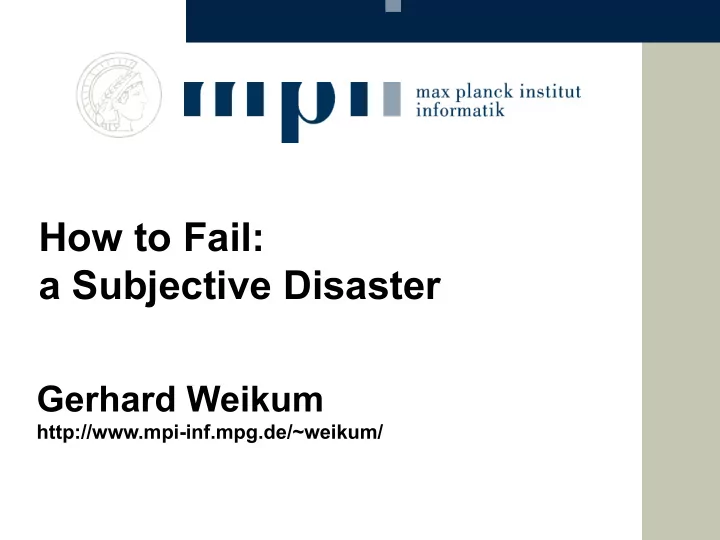

How to Fail: a Subjective Disaster Gerhard Weikum http://www.mpi-inf.mpg.de/~weikum/
How to Fail: 5 Golden Rules Not So Rule 1: Start with list of 10 topics and hire 10+ students Rule 2: If you don‘t make progress hire more students Rule 3: If you run out of money write more grant proposals Rule 4: Be visible everywhere: 5+ papers in DB, 5+ in DM&ML, … Rule 5: Don‘t miss any opportunities: PCs, special issues, panels, … Overcommitment is our professional curse ! Learn how to say No !
Subjective Advice #1 Be passionate and committed! „There are only two mistakes one can make along the road to truth: not going all the way, and not starting.” (Buddha)
Subjective Advice #2 Be bold, take risks! No risk, no gain! „Avoiding failure is not the path to success“ (Simon Pegg in „Hector and the Search for Happiness“)
Subjective Advice #3 Seek advice, but think for yourself! „Don‘t follow the advice of senior people only because they have grey hair“ (Yours Truly) „QA: Question Authority“ (Jim Gray)
What are Good Research Directions: Compass and Map for Research Taste
Key Choices and Trade-Offs Popularity off the main- low high beaten stream path high still interesting: be early & fast exciting: to beat the crowds Difficulty trendsetting opportunity (or be better) underexplored too easy but perhaps boring low
My Personal Choices Popularity off the main- low high beaten stream path DB Auto Tuning DB&IR high Transactions Knowledge Difficulty Harvesting Workflow Multimedia QoS management low
Criteria for Good Topics • Significant benefit: people care about solution • Difficult: no obvious solution • Reachable: hopefully solvable • Methodologically open: variety of approaches conceivable • Simple to state: can be explained in few minutes to any scientist • Incrementally solvable: can pursue intermediate milestones • Testable: can measure progress and success
Meeting Criteria for Good Topics DB Auto Tuning: • Beneficial: overcome DBA bottleneck, reduce $$$ cost • Difficult: automate human expertise, considered daunting • Reachable: automate at least special tasks • Open: heuristics, combinat opt, stochastic model, control theory, … • Explainable: by analogies (car) & specific cases (indexes, load control) • Incremental: approximate DBA, focus on special issues • Testable: competitiveness, workload traces, dynamic load generators Making Sense of Web Tables: • Beneficial: a lot of interesting contents • Difficult: ultimate form of heterogeneous data integration • Reachable: partial success already big progress • Open: declarative programs, machine learning, crowdsourcing, … • Explainable: put structured Web in an integrated DB • Incremental: good enough for search, domain-specific tables, … • Testable: test corpora & tasks, comparison to human
Not Meeting (All) Criteria for Good Topics Semantic Desktop: • Beneficial: perhaps, but need to consider user tasks, not just the data • Explainable: “ envision a semantic web just for yourself “ … ? • Incremental: semi-semantic desktop ? • Testable: user studies difficult, usage logs hardly available, … Web-Scale Graph Algorithms with Map-Reduce: • Difficult: 10 9 * 10 3 * 10 * 0.1 � 1 TB memory � 10K$ • Reachable: easy on paths, daunting on Steiner trees • Open: already sold on one method • Explainable: already lost on explaining MR
Take-Home Message Success requires: skills, creativity, fast learning, insight, stamina, luck, … good research taste “It was much nicer before people started Stroing all their personal data in the cloud.“ “I don‘t know if this is such a wise thing to do, Julia.“ go off the beaten path go mainstream more risk, more fun, � must be fast (or better) Þ more long-term gain Þ
Recommend
More recommend